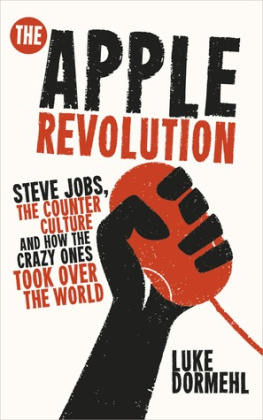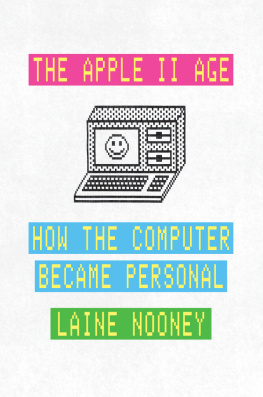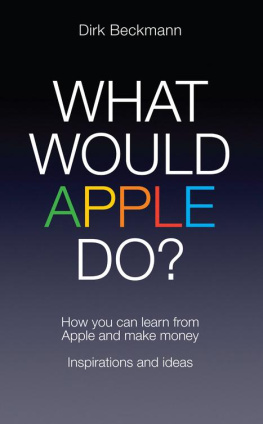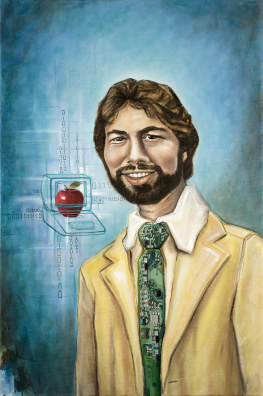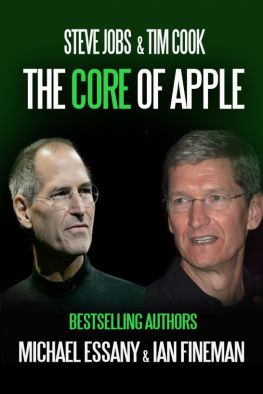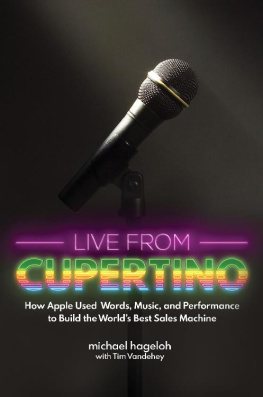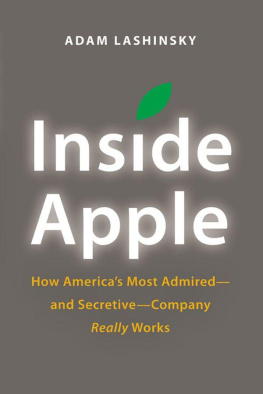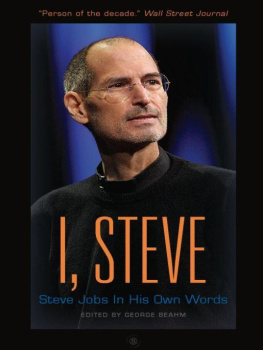CONTENTS
ABOUT THE BOOK
This is the story of how the sex, drugs and rock n roll generation changed the world for ever.
Meet the Crazy Ones who created Silicon Valley the hippies who started the Homebrew Computer Club; the young ad executive who first sketched out Apples iconic logo; the engineers who met lying down in a cardboard geodesic dome at Stanford University. From Steve Wozniak, who built the first breakthrough Apple computers, to Jony Ive, the young Brit who imagined the iPod the designers and programmers, the geeks, creatives and dreamers, they are all here.
And at the centre of it all, a bearded and barefoot Steve Jobs, whose singular vision would will Apple Inc. into a future that it would come to own...
ABOUT THE AUTHOR
Luke Dormehl is a journalist and award-winning documentary filmmaker. With a particular focus on pop culture, his writing has appeared extensively in dozens of online and print publications, while his films have been screened at the Cannes festival and on Channel 4. This is his second book.
To Andy Palmer
AUTHORS NOTE & ACKNOWLEDGEMENTS
As a lifelong fan of high-tech and a similarly longtime fascinated follower of industry trends, I could easily make the argument that the groundwork for this book dates back the best part of three decades. More officially I began work on this project proper in the early part of 2011, several months before Walter Isaacson announced his exhaustive authorised biography of Steve Jobs. For more than a year I conducted over a hundred interviews with former Apple employees, as well as those who knew Steve Jobs, Steve Wozniak and the other major players in this story, in an effort to piece together an important chapter in Silicon Valley history. I thank all of them for their time and willingness to be cross-examined, often on multiple occasions and about the minutiae of events that, in some instances, occurred almost forty years ago.
This is not a business book and nor is it a biography of either of Apples co-founders. Instead this is a history of Apple, Inc. as social artefact: a look at how the countercultural revolution of the sixties and seventies (and beyond) imbued the company with much of its original identity, and continues to do so almost half a century later. There are, naturally, a few tangents. To set the scene I have attempted to paint a picture of the changing face of Silicon Valley cyberlibertarianism. Because the Apple revolution is just one prominent example of other, interlinked revolutions, this is an effort to fill in some of the space surrounding Apple. As such I have also opted, in individual chapters, to tell the story of NeXT, the computer company founded by Jobs during his decade away from Apple, where he had his first experience as CEO, and Pixar, a company which shares much of Apples DNA and which, ultimately, turned Jobs into a billionaire. Since both entities impacted upon Apple in some way, I feel that both of these stories are key to building up that trickiest of things: the bigger picture.
From here simply to add a note of special thanks to all those that have helped me along the way. Ed Faulkner, my tireless editor at Virgin Books, had a seemingly bottomless well of enthusiasm for this book from the start and his good advice continued throughout the writing process. Jake Lingwood, of Ebury Publishing, who helped make this project happen in the first place. My agent, Margaret Hanbury, whose unwavering support was always greatly appreciated. My good friends Tim Matts and Alex Millington, who both read over various sections of the book and offered detailed and incredibly useful feedback and suggestions. Vicky Thomas, who proved a far speedier transcriber than I could ever hope to be. In addition much love to Clara, as well as assorted friends and family members too numerous to list.
A note of gratitude, too, to those intrepid Apple chroniclers who came before me. Several books proved particularly helpful in researching The Apple Revolution. John Markoffs fabulous What the Dormouse Said may very well be viewed as a spiritual prequel to this tome, dealing with the social history of the personal computer up to the point at which Mr Jobs and Mr Wozniak first arrived on the scene. Michael Moritzs Return to the Little Kingdom (originally published under the title, The Little Kingdom) laid the groundwork for all Apple books to have come after, and is required reading for anyone wanting more information about Apples early years. Frank Roses West of Eden is something of an underrated gem, dealing with the companys inner-workings in the mid-1980s. Both Randall Stross Steve Jobs & the NeXT Big Thing and Alan Deutschmans The Second Coming of Steve Jobs perform different, but equally enthralling, functions regarding Jobs lesser-known wilderness years outside of Apple.
Last but certainly not least, I reiterate my sincerest gratitude to all those who agreed to speak with me as part of my own research (both on and off the record), along with those working at Apple and other such high-tech companies today. Without their constant attempts to invent the future, there would be nothing for us tech writers to write about in the first place.
In the beginning (of the Information Age) was the void. And the void was digital. But lo, there came upon the land, the shadow of Steven Jobs (and Stephen Wozniak). And Steven (Stephen) said, Let there be Apple. And there was Apple. And Steven (Stephen) beheld Apple. And it was good. And Apple begat Macintosh. And it was good. And soon upon the land there began to appear, The Cult of Macintosh. For they had tasted of Apple. And it was good.
Russell W. Belk and Glnur Tumbat,
The Cult of Macintosh,
Consumption, Markets and Culture,
Vol. 8, No. 3, September 2005
Ready or not, computers are coming to the people. Thats good news, maybe the best since psychedelics.
Stewart Brand,
Spacewar: Fanatic Life and Symbolic Death among the Computer Bums, Rolling Stone magazine, 7 December 1972
Never trust a hippie.
Malcolm McLaren, former manager of the Sex Pistols
PART I
THE TWO STEVES
Prologue
TALKING ABOUT IGENERATION
I think hackers are the most interesting and effective body of intellectuals since the framers of the US Constitution. No other group that I know of has set out to liberate a technology and succeeded. They not only did so against the disinterest of corporate America, their success forced corporate America to adopt their style in the end High tech is now something that mass consumers do, rather than just have done to them The quietest of the 60s sub-subcultures has emerged as the most innovative and most powerful and most suspicious of power.
Stewart Brand,
Whole Earth Review (1985)
A New Yorker driving homewards one day in late March 1999, who just so happened to glance upwards while travelling down Manhattans East 14th Street, might well have received something of a surprise. Between Avenue A and B, a giant 246-square-foot billboard bearing Apples familiar Think Different slogan was bolted to the side of a six-storey tenement building. The existence of the billboard itself was nothing out of the ordinary. Nor was the line of copy, which the Cupertino-based computer company had been using to great acclaim since 1997, the year in which co-founder Steve Jobs had returned to the fold after a decade in the high-tech wilderness. The tagline put into ungrammatically exact words what Apples bosses, employees and fans had been saying since day one. Apple thought different(ly).
Next page
